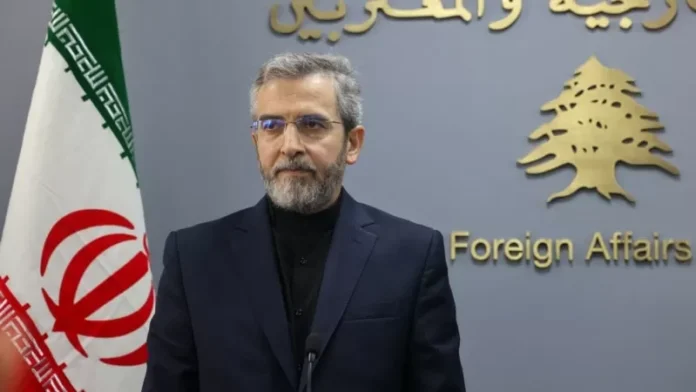Beirut, Lebanon – Tensions between Iran and the United States have been high for decades, but there may be hope for resolution in the near future. Acting foreign minister Ali Bagheri announced on Monday that Iran has been engaging in negotiations with the US, with Oman acting as the host and mediator.
This news comes as a potential breakthrough in the strained relationship between the two countries, who have not had diplomatic relations since the 1979 Islamic Revolution in Iran. Bagheri, speaking at a news conference during his visit to Beirut, assured that talks have been ongoing and have never stopped.
In March, the British daily Financial Times reported that Bagheri was involved in indirect talks with the United States in Oman earlier this year. This development is significant, considering the recent escalation of tensions in the region following the Israel-Hamas war in the Gaza Strip.
The relationship between the US and Iran has been muddied by their opposing alliances. The US is a close ally and top provider of military assistance to Israel, while Iran supports the Palestinian militant group Hamas. Bagheri’s visit to Beirut coincides with his first foreign trip since assuming the interim role following the death of Hossein Amirabdollahian in a helicopter crash last month, which also claimed the life of Iran’s president, Ebrahim Raisi.
The choice of destination for Bagheri’s visit is not a coincidence. He stated that Lebanon was chosen because “it is the cradle of resistance” against Israel. Iran has long been a supporter of the powerful Lebanese group Hezbollah, both financially and militarily. The Shiite Muslim movement, which is also an ally of Hamas, has been engaged in regular cross-border fire with Israel since the start of the Gaza war in early October.
Aside from diplomatic tensions, Iran is also facing pressure from Western powers regarding its nuclear activities. Bagheri, Iran’s former top nuclear negotiator, reassured that discussions are ongoing. The fear of Western governments is that Iran is seeking to develop a nuclear weapon, which the Islamic republic vehemently denies. Bagheri urged the Western powers to not miss this opportunity for resolution and to make up for any past inaction.
As the meeting of the United Nations nuclear watchdog opened in Vienna, Bagheri stated, “We advise them not to miss the opportunity any further and compensate for the actions that they must have carried out but didn’t.” This statement comes as Britain, France, and Germany seek to censure Iran over its lack of cooperation with the International Atomic Energy Agency (IAEA) at the organization’s board meeting.
In March, European powers shelved their plans to confront Iran due to a lack of support from Washington. However, with the recent talks between Iran and the US, there may be a shift in the dynamics. Bagheri’s visit to Lebanon and Syria, scheduled for Tuesday, could further improve the prospects of diplomatic resolution between Iran and Western powers.
This news of potential negotiations between Iran and the US has sparked hope for a positive outcome in the region. The ongoing conflict and tension between the two countries have caused widespread concern and destruction, and a resolution would undoubtedly have a positive impact on the global community.
In the midst of this newfound hope, it is crucial for all parties involved to continue engaging in meaningful discussions and find a peaceful solution. The international community must support and encourage these efforts towards diplomacy and resolution in the Middle East. Let us hope that this will be a crucial step towards lasting peace and stability in the region.

